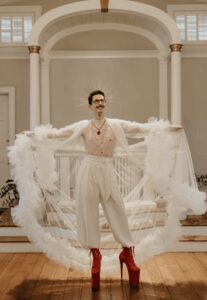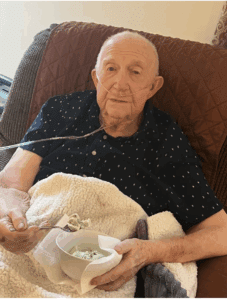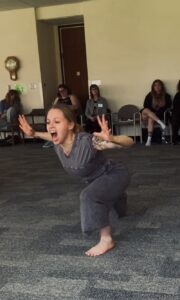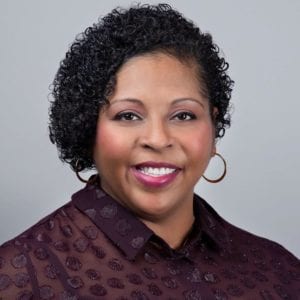Hi, my name is Destiny. I live with a birth defect called Spina Bifida. It is what I have NOT who I am. That being said, it affects my daily life in many ways including how I show up in the world and how I interact with it. My life is not a script from a made for TV movie. I am often viewed similarly to those “As Seen On TV” infomercials. I know you have seen them. You’ve probably even brought into some of them yourself. They are often products that fail to meet your expectations from what they were claiming to be in the ads or you get them home and they work amazingly well only to malfunction right after the 30-90 day money-back guarantee runs out!
That is NOT me either but you may have been fooled into thinking either example above is the reality of my life. The current state the world is in with protests and riots over racism has sparked a few heated debates. There has also been huge worldwide news coverage of the entire situation. With media comes creative license and with that comes a whole host of other issues that I will dive into a few of here later.
Recently an article came across my screen and again in my inbox. The article is titled 8 Influential Black Women with Disabilities to Follow. It was published within the time frame of everything going on.
HOLD THE PHONE…RED FLAG!
Black = Minority
Women = Unequal (if not considered a Minority)
Disabilities = Minority
Influential = We are supposed to inspire you to change because “if we can do it with the challenges life throws at us, WHY THE HECK CAN’T YOU?” That’s called inspiration porn and can come in many forms, including memes. The disabled person in those cases is never asked so they are not consenting to the creation of the material.
I do not wish to demean anything that the eight women mentioned in the post do to make a living. What the women have accomplished is wonderful but not because of a disability. I do desire to bring light to some of the finer, missed, or overlooked points. All disabled people have many unique gifts and talents. As a disabled person I know we are often seen as a lesser value because we do things differently. What I have a huge problem with is using innocent disabled women as a weapon. It was painfully obvious to me that this was the case. The article might as well have been titled “Proof the US Government Isn’t Racist and Doesn’t Discriminate.” I am a disabled, white woman from Canada and I’m not okay with that!
Disability is defined in two ways. A physical or mental condition that limits a person’s movement, senses, or activities. The second is a disadvantage or handicap especially one imposed or recognized by law. How it is defined is problematic. It fails to realize that disability means different things to different people. It also fails to give a clear picture of what a disability looks like. It can’t give one because it’s an umbrella term that is viewed as having one meaning. This results in a disabled person having to advocate for themselves proving themselves again and again in a world where nobody believes them. They are left to pave their path in the world largely being fought against and misunderstood.
In the article of all the disabilities mentioned, we have a Harvard law graduate, nurse, clothing designer, and others. Great! anyone with or without a disability can do any of those things. The law graduate doesn’t appear to be working within the legal justice system and likely never will. The nurse says she has to fight to do the work of a nurse and not do anything except sit behind a desk because she obviously can do that so she should. She appears to have become slowly disabled over time and was possibly a nurse before becoming disabled. The clothing designer is an amputee, missing a leg. That has nothing to do with her ability to sit behind a sewing machine, at a computer or desk to draw wonderful designs for clothing. When wearing her creations and taking pictures they are cut off so the prosthetic doesn’t show! Many of the others are in the entertainment industry and every last one of them is into disability rights, activism, or advocacy of some sort except the nurse. I think you are starting to get the picture here and seeing a pattern. Disability and Sex have something in common…THEY SELL!
The entertainment industry is the area that has the big bucks. The harsh reality is the big bucks don’t go far when you are someone living with a disability and have more to cover due to the disability compared to other people. There are models, dancers, and actors that do have disabilities. The big questions…are they working for the same companies as anyone else? Or are they all working with companies that are specifically for those with disabilities even their type of disability? The reality very well may be that they are a model, or they are a dancer or an actor but maybe only had one shot at being either of those things.
When you hear about disabled models and actors on TV what you are most familiar with seeing are able-bodied people posing as or acting the part of a disabled person. (i.e. a wheelchair user) Rarely in any movie do you see someone with a disability playing the part of their disability. The same is true for images for ads to sell products. To a disabled person using an able-bodied person to act like them is very offensive and comes off as very fake. We know what we live with daily isn’t anywhere near as good or as bad as what is shown. I know some of the disabled people mentioned in the article, not personally, but from social media. That’s what many of them do mostly not model or act.
I mentioned briefly about companies for disabled people. I don’t want to mark them as good or bad but I will say this: their existence is discrimination with a friendly face with the focus being on the disability, not the person. It makes able-bodied people look good and seem like great people when they create things like this for a part of society seen as weaker, unimportant, and less than anyone else. Don’t subscribe to the images you have seen in the media as what disability is. It’s truly not reality or an in-depth view of disability.
There is also a huge problem with mainstream companies using those with disabilities for photo opportunities or campaigning as a way to make themselves or a brand look good. The disabled person is used only because they are disabled and fit an image a company wants to portray. It’s called tokenism. By subscribing and buying into that sort of media you are allowing the people that paint disability in that way the right to do so. It’s not only a problem on mainstream media but social media in the form of inspiration porn.
By necessity people with disabilities have to become adaptive and learn ways to navigate the world. This is not because we want to but we have to if we are to survive in a world that wasn’t made for us to fit. Our biggest fight is often to have accommodations and modifications met. We are seen as needy, selfish, or as creating DRAMA. You may not always understand some of our needs, that doesn’t mean we don’t need accommodation or modifications. You don’t have the right or ability to determine that.
We are often not heard, seen, or respected as individual human beings capable of things. We are expected to be poster children and spokespeople for our disability. That’s the path the world laid out for us. The one that money can be made for their benefit.
Two extremes exist but there is a larger group in the middle who don’t desire fame and dread being seen as an object to be pitied than there are people who are in the public eye being viewed as amazing overcomers of their disabilities instead of being accepted as people with them. Just because we are capable of working doesn’t mean we are magically not disabled anymore.
If someone has the chance to and wants to pursue a career in entertainment they should be able to no matter if they are disabled or not. Nobody should be placed in a position where they have to sell their disability to earn a living or worthy of the space they take up. It’s time we stop all the toxic positivity and inspiration porn that disabled people face. It’s time to embrace the struggle and raw, real human beings we truly are!
My reality as a disabled person is a person who struggles to fit into the two extremes while truly not wanting to be part of either one of them. What my experience is I can best sum up in a quote from Dr. Jamie Marich: “As a society, we tend to celebrate those that perform well hurt and we criticize or even demonize those that ask for help or otherwise show weakness.” For those of us in the middle, we are celebrated for being disabled while criticized and demonized for the same thing.
That’s my story and I’m sticking to it.














